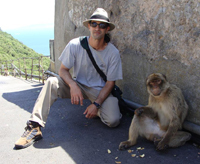
Who are we? Why are we here? Why do we do what we do? What makes humans unique?
These are the universal questions at the heart of an ambitious new initiative led by University of Notre Dame anthropologist Agustín Fuentes.
Funded by a $197,000 grant from the John Templeton Foundation, the Human Natures Project is a two-year research effort that could pave the way for a much larger, long-term endeavor.
“The idea really is to find a path forward into a multidisciplinary conversation on human nature—and I want it to happen here at Notre Dame,” says Fuentes, the director of the University’s Institute for Scholarship in the Liberal Arts and a professor in the Department of Anthropology.
While many scholars explore the essence of human nature, they continue to do so within specific academic disciplines, Fuentes says.
“The problem is that people ask that question from all these different perspectives, and the perspectives almost never talk to each other,” he says. “So if you read it in theology, it’s going to tell you one thing. If you read it in biology, it’s going to tell you another thing. If you read it in psychology, it’s going to tell you another thing—and the same for philosophy and anthropology.”
Fuentes recalls the old Indian tale of the blind men and the elephant, where each man touches a separate part of the animal, leading them to dramatically different conclusions about the animal.
“Each one of them is actually describing something that’s real, but they have no idea of the whole big picture,” he says. “What I’m hoping is that there’s actually a big picture out there for human nature and that maybe by trying to get together and work in a cross-disciplinary context we can find it.”
Fuentes says his goals for the initial two-year project are to determine whether the disciplines share any common or overlapping definitions and methodologies that could be a starting point for conversation and to explore whether “there is something about human culture and its connection with human evolution that might be a nexus for us to look at this commonality.”
To help answer those questions, he will review relevant literature and then personally interview top human nature scholars within each of the different fields.
“I’m not only looking at what people actually published officially out in the academic world, but what do they really think? Is this worthwhile? Is there a way to do this?” Fuentes says. “I want to try to connect the published work with the personal ideas and philosophies of these individuals. I think one of the best ways to really get beyond the disciplinary boundaries is talking to the people who are actually doing this.”
In particular, Fuentes is interested in discussing the emerging theory of biocultural evolution. “The way it’s structured enables it—I think—to be the place where theology, psychology, philosophy, anthropology and biology can engage in real discussions that move us forward in an understanding of what human nature or natures might be,” he says.
In the first year, Fuentes will conduct the interviews, form a team of graduate and undergraduate students to help gather information, and develop an interdisciplinary working group of Notre Dame faculty members. The second year will be for analysis, publishing and organizing a conference tentatively set for May 2013.
Fuentes also plans to create a website similar to “On the Human,” which is a project of the National Humanities Center. “It would be a virtual center for the study of human nature, where academics and intellectuals get together to think big things and post ideas online where they are accessible to the public,” he says.
Calling this new research initiative “a huge, adventuresome project,” Fuentes says he is eager to see what he discovers over the next two years.
“I want to see if it looks like we have something,” he says. “And if we do, I want to expand this into an ongoing multi-year, multi-decade project housed at Notre Dame—because where else can you really think truly interdisciplinarily about human nature?”
Originally published by at al.nd.edu on March 10, 2011.